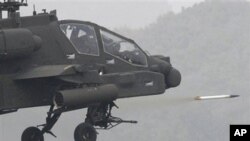South Korea for the first time is leading a multinational maritime exercise under the Proliferation Security Initiative, known as PSI. The program is intended to intercept illicit weapons and materials to make weapons of mass destruction. Seoul had initially been reluctant to join such drills to avoid antagonizing Pyongyang.
The two-day naval drill is taking place in the waters near the South Korean city of Busan.
South Korean defense officials stress the exercise is not targeting any particular nation. But Carl Baker, director of programs at the Center for Strategic and International Studies' Pacific Forum, in the U.S. state of Hawaii, says one country is in mind.
"Clearly the South Koreans, in this case, are targeting the North Koreans to send a message to North Korea, and clearly North Korea has been one of the countries that have been involved in proliferation activities," Baker said.
North Korea says South Korea's participation violates the 1953 armistice on the peninsula because it is tantamount to blocking sea lanes. After Seoul joined PSI last year, Pyongyang angrily proclaimed it "a declaration of war."
South Korea's military, for the first time is leading a PSI drill with two naval torpedo destroyers, a pair of landing ships and four submarines.
The U.S. Navy has sent a guided missile destroyer. Japan's Maritime Self Defense Force has dispatched a destroyer and helicopters. An Australian maritime patrol plane also is participating, while other countries have sent observers.
Nearly 100 countries have joined the loose PSI coalition since its inception seven years ago. Its goal is to find and stop illegal shipments of weapons of mass destruction and their components, or other contraband.
South Korea was initially reluctant to participate, because of Seoul's policy of trying to engage more closely with North Korea.
It fully joined after North Korea detonated a second nuclear device last year. International arms proliferation experts say Pyongyang has both sold and purchased banned weapons in the past.
Baker says this year's sinking of a South Korean naval vessel, for which North Korea is blamed, led to this exercise.
"The provocation by North Korea in sinking the ship, I think, convinced South Korea that it was time to be a bit more assertive and much more willing to cooperate in a multilateral setting to demonstrate a willingness to deal with proliferation activity," Baker said.
On Thursday, officials from several PSI countries, including Argentina, Canada, Chile, France, Italy, New Zealand, South Korea, Spain, Turkey and the U.S. will discuss collaborating on ship interdictions.
South Korea Leads Maritime Training on Intercepting Illegal Weapons




